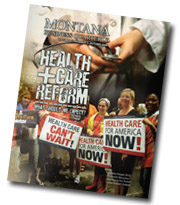MONTANA BUSINESS QUARTERLY
Volume 47, Number 3, Autumn 2009 |
|||
 |
Health Care Reform: What Should We Expectby Gregg Davis |
||
In polls across the country, fixing health care is right up there with fixing the economy. Emotions are high on both sides of the health care debate. The issues driving health care reform are basically twofold: access to health care for the uninsured and cost. Reform of some shape will have to occur because our present health care cost projectory is unsustainable. Exactly when and what shape that reform takes we'll have to see. | |||
Healthy People 2010The Montana Experienceby Gregg Davis |
While Montana has achieved several of its Healthy People 2010 targets, the state struggles with a number of health care measures including childhood vaccinations, blood cholesterol screenings, Pap tests, and suicide deaths. Healthy People 2010 helps local, state, and federal programs access health care progress. |
Economic OutlookMontana's Recovery is Closerby Patrick M. Barkey |
The forecasting business is by its very nature future-oriented. So even though evidence of the recession remains depressingly easy to find, the signs of recovery in the coming months are becoming clearer as well. The question for Montana's economy is, what will the recovery look like? |
Managing Montana's Forest LandsThe Next 100 Yearsby Tom Schultz and Jordan Larson |
As Montana celebrates the 100th anniversary of state forestry, mills continue to close, production is at a fraction of historic levels, and the prospects for the state's wood products industry are dimmer than ever before. Controversies over timber, endangered species, fire, wilderness, public participation, and water have characterized the lack of management of the national forests for the past 20 years. Talk of a new approach for managing national forests is circulating. What's ahead for Montana's forests? |
Montana's Labor PollMore Workers than Anticipated Available to Fill Jobsby John Baldridge |
With Montana's median wage rate over $2 an hour lower than the national median wage rate, it should not be surprising that nearly half of the state's workforce is willing to switch jobs in order to earn more money. According to BBER's Montana Labor Market Analysis Survey, the labor pool available to staff business expansions or to replace turnover is significantly larger than well-known statistics like the unemployment rate suggest. |

